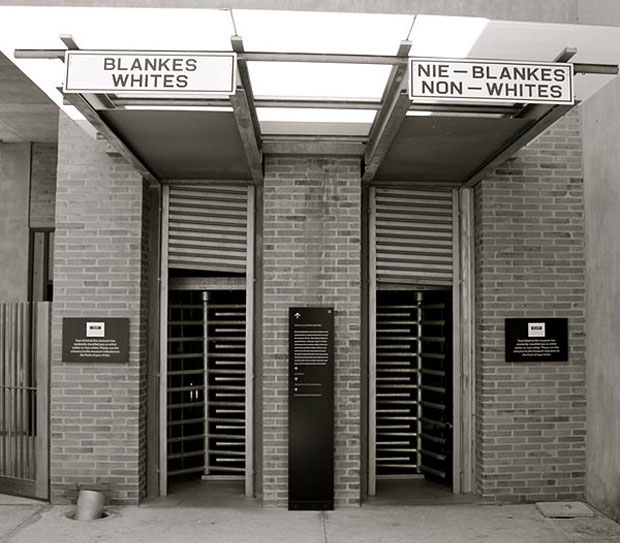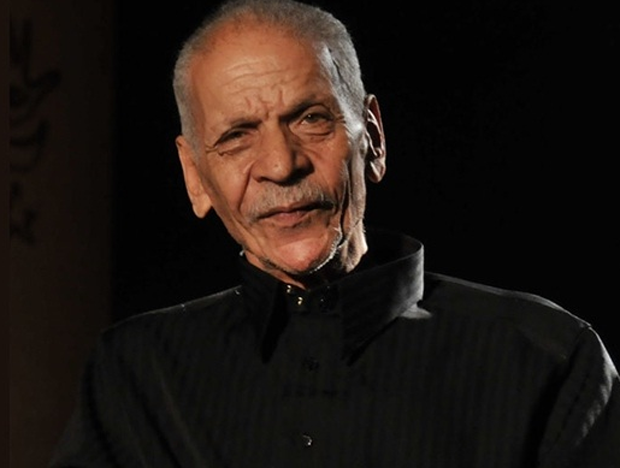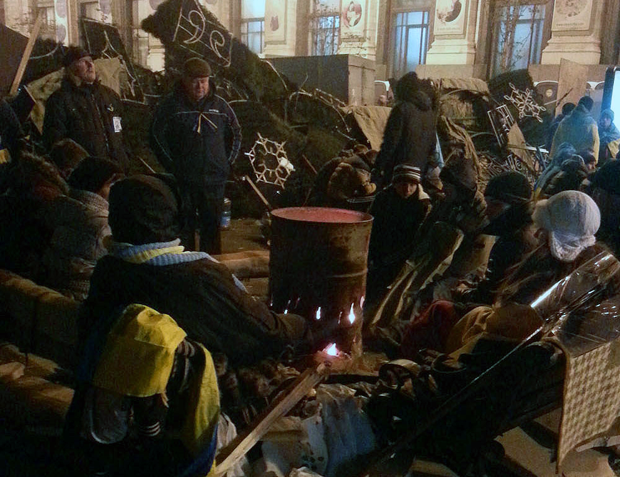5 Dec 2013 | News, South Africa

(Image: Annette Kurylo/Wikimedia Commons)
If Nelson Mandela’s legacy is summed up by one thing, it will be in symbolic moments, like the times when those “whites only” signs were torn down, no longer shouting that South Africa was a society where only its white people had opportunity, and aspiration, and when a reborn nation began its journey on a previously uncharted road to freedom.
At Index on Censorship we have collected significant articles from our archive that trace the history of the apartheid struggle, and some of the great writers who have commented, argued and analysed it for our magazine, including Nadine Gordimer and Albie Sachs.
Please browse them and remember the immense changes that Nelson Mandela helped make happen.
5 Dec 2013 | Egypt, News, Religion and Culture

Ahmed Fouad Negm (Photo: © Ahmed Manawishi)
The Egyptian poet Ahmed Fouad Negm died on December 3 at the age of 84.
Known as the “poet of the people”, Fouad Negm inspired generations of young Egyptians to hope for change through his prose which often struck a comparison between his love for his country and a harsh criticism of its flaws. It was during the 1970s that his poetry became most popular as musician Sheikh Imam Issa sang his works in coffee houses and universities.
His political views in favour of the poor and working class were often expressed in his poems which lead him to be jailed under the rule of two former Egyptian presidents: Gamal Abdel Nasser and Anwar Sadat. Fouad Negm was also vocal regarding his support for the 2011 uprising that witnessed the demise of the Mubarak regime.
“I am not a humble person and I am not stupid; I know I am a poet that has affected this nation,” he once told an interviewer.
Fouad Negm’s passing comes a week before he was due to travel to the Netherlands to receive the 2013 Principal Prince Claus Award in appreciation of his literary contributions and his unwavering advocacy on behalf of the poor and the disenfranchised.
The Prince Claus Fund said: “Ahmed Fouad Negm is honoured for creating true poetry in vernacular Arabic that communicates deeply with people; for his independence, unwavering integrity, courage and rigorous commitment to the struggle for freedom and justice; for speaking truth to power, refusing to be silenced and inspiring more than three generations in the Arab-speaking world; for the aesthetic and political force of his work highlighting the basic need for culture and humour in harsh and difficult circumstances; and for his significant impact on Arabic poetry bringing recognition to the rich literary potential of the colloquial language.”
This article was published on 5 Dec 2014 at indexoncensorship.org
4 Dec 2013 | About Index
Thank you for your interest. The application period for this position has now ended.
Index on Censorship magazine is looking for an assistant editor with a good knowledge of global politics, free expression and human rights to join their London-based office.
In the past 41 years the magazine has published some of the greatest names in journalism, literature and politics, and it has a global readership.
The ideal candidate will have strong experience working within an editorial team plus excellent writing, editing and sub-editing skills. Attention to detail is a must, as are excellent grammar skills and a confident writing style. They will be able to source and commission stories from journalists and writers around the world, and must keep up to date with global news stories.
Candidates should have experience:
- Planning and pitching stories
- Working to tight deadlines to write, edit and sub-edit copy
- Managing contributors, staff writers and interns
- Using Photoshop and InDesign
- Organising a database of contributors
Salary: Depending on experience, £30-35K pa
—–
ASSISTANT EDITOR / JOB DESCRIPTION
EDITORIAL
Magazine
Suggest ideas for and commission articles to a specific brief
Edit copy from authors and proof copy
Write articles for the magazine
Co-ordinate and source illustrations and photographs for the magazine, including adjustment of contrast levels and resizing
Co-ordinate with the designer on the magazine’s cover, including illustration/photo selection and sourcing, image and text placement
Commission translators and keep a database of translators
Manage and liaise with writers, proofreaders, translators, agencies and photographers, including arranging payment, fielding general queries, updating the contributor database, and distributing copies of the magazine
Liaise with Sage (the publisher) on production schedule of the magazine
Co-ordinate advertising for the magazine
Maintain good relationships with authors, photographers and illustrators
Index website
Write and upload articles on the magazine for the website using a content management system. Raise the profile of articles by tweeting out articles; posting on Facebook
Production
Organise author contracts for each issue, and distribute to authors for signature
Arrange payments for authors
Co-ordinate a financial record of the costs of each issue
GENERAL OFFICE/ADMINISTRATIVE WORK
Send out copies of the magazine to authors and other relevant parties
Contribute to the Annual Report; the CEO report and other reports on editorial work, such as funder reports.
Organise payments and contracts for photographers, photo agencies and writers
Update the Index style guide
Attend and help at magazine launches
—–
Knowledge, Skills & Abilities
Essential
1.1 Exceptional level of editing ability, grammar knowledge and experience of writing in different styles.
1.2 Highly organised at juggling multiple tasks against deadlines
1.3 Exceptionally talented at having a regular stream of feature ideas and commissioning them.
1.4 Experience working with photographers or photographic agencies, artists and authors as well as organising invoices.
1.5 Experience of interviewing, writing and reporting
1.6 Ability to use Photoshop and InDesign.
1.7 Experience managing a database.
1.8 Good cultural and current events knowledge
Desirable
1.8 Fluency in Mandarin, Spanish or Arabic.
1.9 Experience using WordPress.
2.0 Knowledge of copyright
2.1 Experience working with typesetters and production teams
—-
APPLYING
Thank you for your interest. The application period for this position has now ended.
4 Dec 2013 | European Union, News, Ukraine

Protesters gather in Maidan Nezalezhnosti to register their disapproval of the government’s refusal to sign an association agreement with the European Union and its violent crackdown on peaceful demostrators. (Photo: Andrei Alaiksandrau / Index on Censorship)
Maidan Nezalezhnosti, the Independence Square in the centre of Kiev, leaves mixed impressions of courage and uncertainty. It has become a symbol of determination among ordinary Ukrainians to push for their rights and freedoms – but after the events of the last weekend it has also turned into a powerful reminder of how difficult and even bloody the fight can be.
Mass actions in Ukraine started on 21 November after it became clear that the country’s leaders were not going to sign a much anticipated association agreement with the European Union. The situation escalated after 29 November, when it was confirmed the agreement was not signed during the Eastern Partnership summit in Vilnius. Around 4 a.m. on 30 November riot police violently dispersed protesters from the Independence Square. Dozens of peaceful protesters and journalists were injured. The next day saw one of the largest mass street rallies in Ukrainian history, at least 200,000 people protested against the violent actions of the police. New clashes occurred; protesters and opposition parties called for the government to resign, but the vote of no confidence in the parliament failed. At the moment nobody has a clear answer what comes next.
There are a lot of young people among the protesters. Yuliya, a student of one of Kiev universities, says they are there to “defend their future.” “We want to live in a European country, and feel we are citizens that enjoy rights and freedoms,” she says. Several students said officials at their universities “promised troubles” to those who joined the protests. Some of the student demonstrators told Index that they were threatened with expulsion – but came out into the streets anyway.
Andrii is an employee of an IT firm from Lviv, a regional centres in western Ukraine. He and his friends traveled to Kiev to join the protest for several days during the last two weeks, despite the fact it is more than 500 km drive each way. “It is a crucial time for my country; I cannot just stay home when the fate of my nation is decided. The association agreement with the EU is a historical chance for Ukraine, the chance not to be missed,” he says.
“I went to Maidan, because I want to live in a European country; I want to walk even pavements, drive quality roads, enjoy quality public services for the high taxes I pay – and I don’t want to see my taxes go to pockets of president Yanukovich and his family. Directives of the EU establish quite high requirements for fighting corruption, this is why I support association with the European Union,” says Khrystyna, a lawyer from Kiev.
Roman Romanov, an expert on freedom of assembly with the International Renaissance Foundation, says he has never seen so many people in the streets of Ukraine.
“Now it is not only people who want the association agreement with the EU to be signed. People raise their voice against the police state and brutality against peaceful protesters; they understand that without them speaking out the rule of law will not be restored and justice will not be done,” Roman Romanov says.
Oksana Romaniuk, an executive director of the Institute of Mass Information, a Kiev-based freedom of expression organisation, also sees the difference in how society treats journalists.
“Fifty-one journalists were beaten by riot police in Ukraine between 29 November and 2 December. On the night of 30 November officers of Berkut, a riot police special force, specifically targeted journalists when they were dispersing the protest from the Independence Square. Now local businessmen offer their help to us – they buy first aid kits for journalists and offer money to cover medical treatment for injured reporters. And ordinary people suggest their help, too. I was really moved when a woman came up to me in a bus, as she heard I was ordering protecting helmets and vets for journalists. The lady gave me 200 hryvnias (around £15) and said ‘I have heard how journalists were beaten – please, take this money to help them’. I hope these are the signs that show society understands the importance of journalists’ work to inform people,” Oksana Romaniuk says.
“I did not know I live in a country where a bloody dispersal of a peaceful meeting can happen, where such inhuman brutality against unarmed people and journalists is possible. It is a disgrace for Ukrainian authorities,” she adds.
State officials of Ukraine promise they will make up for this “disgrace” and investigate the violent actions of the police. At the same time, president Yanukovich left for an official visit to China, despite the serious political crisis his country is in. The OSCE Parallel Civil Society conference called the situation in Ukraine “a human dimension crisis.”
“It looks like the authorities want to show they do not care about people that stay at Maidan. It is difficult to say what is going to happen next. I could not believe that happened in my country. Now I don’t see how this crisis is going to be resolved,” says an employee of a Kiev-based human rights organisation.
Last night it was peaceful at Maidan Nezalezhnosti. There was a concert with Ukrainian patriotic songs. People were sitting around fires in barrels; a dozen youngsters decided to warm themselves by playing football just beside a barricade. No police were seen anywhere.
“Would you like a cup of tea?” asked a young Ukrainian girl with a warm smile – she is just walking around Maidan with her boyfriend and a big thermos and offers a free hot drink she made at home to people who came out in a cold night to tell their government they choose a European future for their country. Will they be heard, remains a question.
This article was posted on 4 Dec 2013 at indexoncensorship.org



